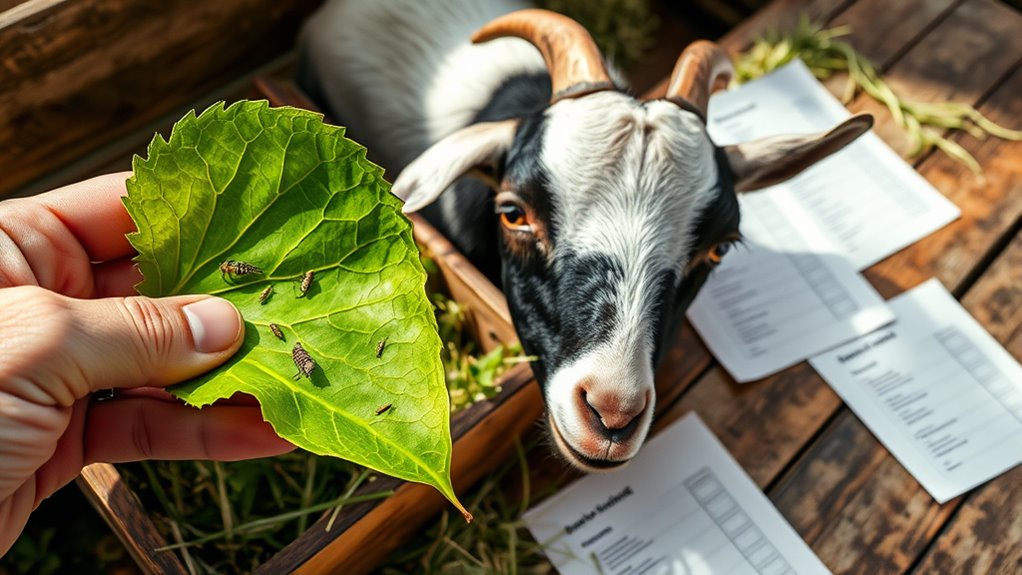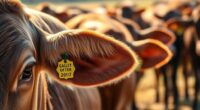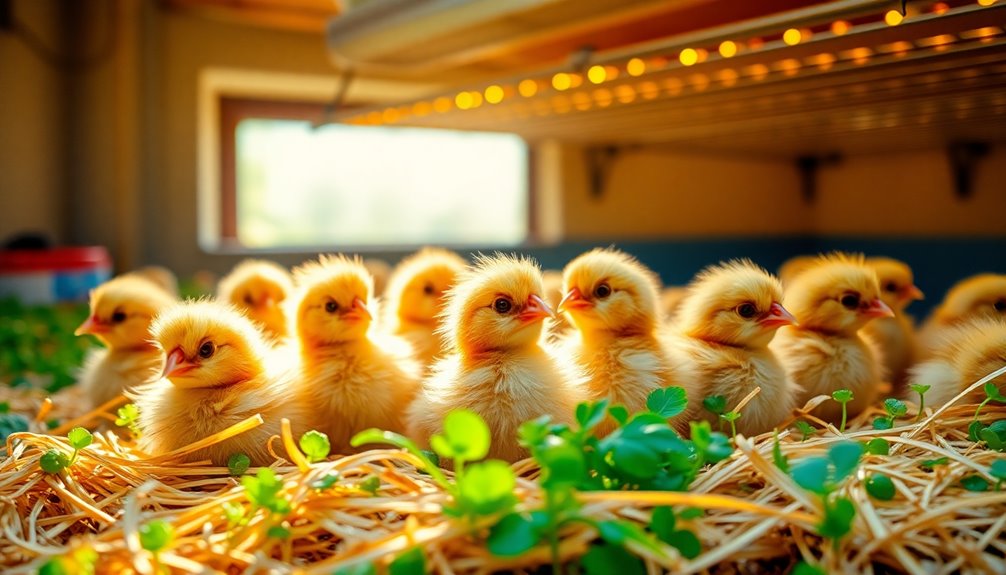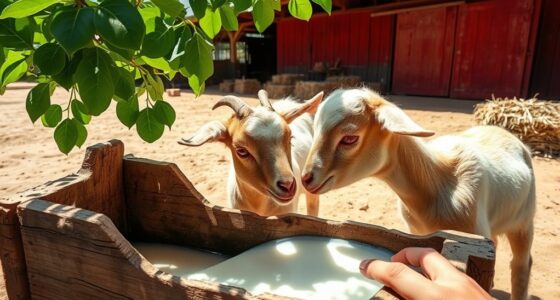During midsummer, you should regularly check your goats and sheep for signs of parasites like barber pole worms, which thrive in warm, humid conditions. Focus on monitoring grazing patterns, rotating pastures to limit exposure, and watching for symptoms such as weight loss or anemia. Using proper testing methods and combining pasture management with herbal remedies can help control infestations. Stay with us to discover more effective strategies for keeping your animals healthy all summer long.
Key Takeaways
- Regularly inspect goats and sheep for signs of parasite infestation, such as weight loss, diarrhea, or anemia.
- Monitor pasture conditions and rotate grazing areas to reduce exposure to infective larvae.
- Conduct routine fecal tests using proper methods to detect parasite levels early.
- Implement strategic grazing management, including moving animals to fresh pastures during peak risk periods.
- Incorporate herbal remedies like garlic and neem to support natural parasite control alongside pasture practices.
Key Parasites to Monitor During Midsummer
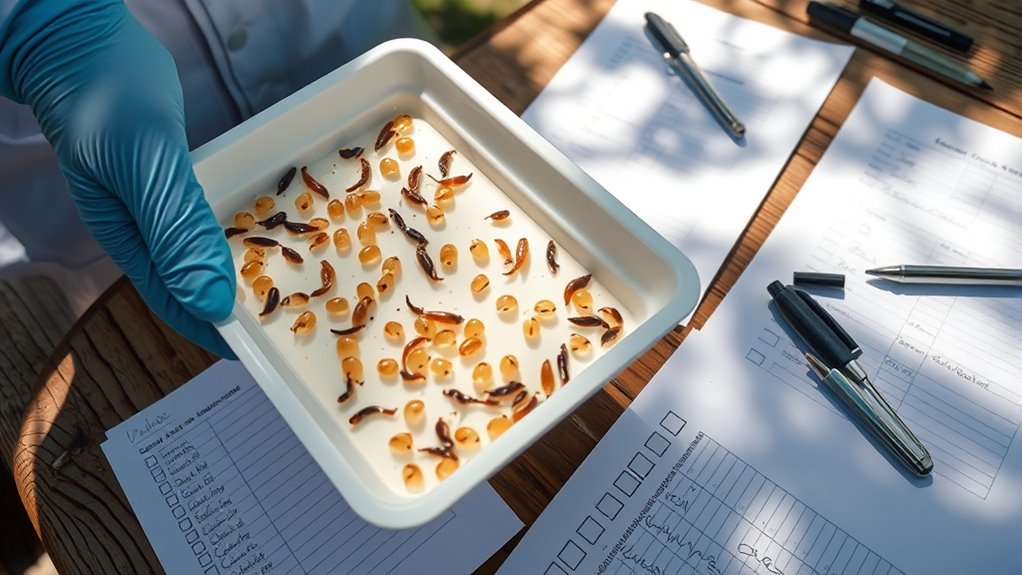
As midsummer arrives, it’s vital to stay vigilant for certain parasites that thrive during this warmer, humid period. Understanding the parasite lifecycle helps you identify when animals are most at risk. Most parasites complete their lifecycle quickly in summer, especially when grazing conditions are ideal. By managing grazing effectively, you can interrupt this cycle—rotating pastures reduces exposure to infective larvae. Watch out for common culprits like barber pole worms, which infect sheep and goats during this time, and monitor for signs of infestation. Keeping animals healthy involves knowing the parasite lifecycle stages and adjusting grazing management accordingly. Early detection and strategic pasture rotation can considerably lower infection rates, ensuring your goats and sheep stay healthier throughout midsummer.
Effective Strategies for Parasite Prevention and Control
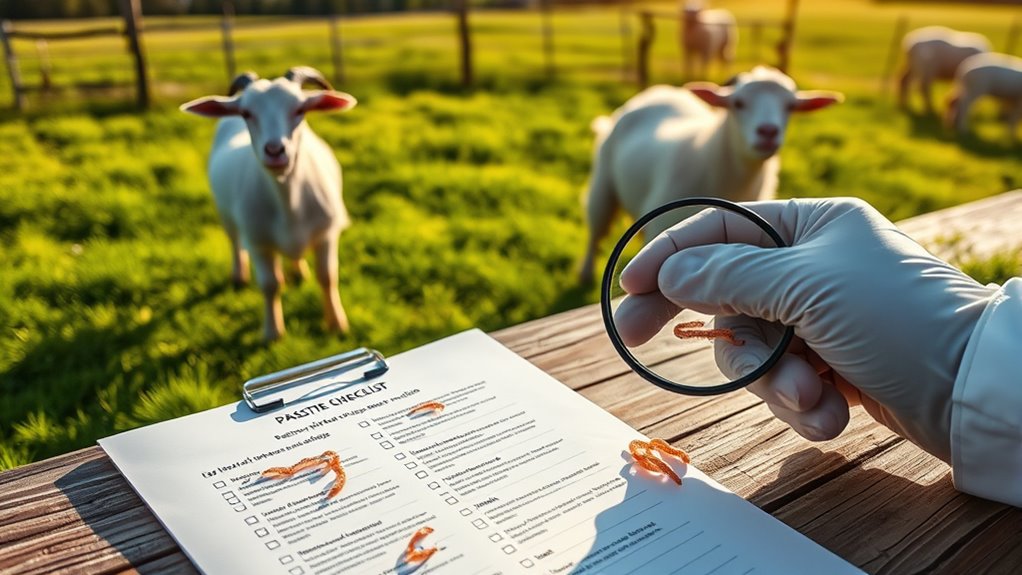
Implementing effective parasite prevention and control strategies is key to maintaining healthy goats and sheep, especially during high-risk periods like midsummer. Rotational grazing helps reduce parasite loads by moving animals to fresh pastures, preventing overexposure to contaminated areas. This practice disrupts parasite life cycles and keeps pasture contamination in check. Additionally, incorporating herbal remedies can support your livestock’s immune system and naturally suppress parasite development. Herbs like garlic, wormwood, and neem are popular options that can be integrated into their diet or used as supplements. Combining rotational grazing with herbal remedies creates a holistic approach that minimizes reliance on chemical treatments, reduces resistance, and promotes overall herd health. Regular monitoring of parasite levels with proper testing methods ensures timely interventions. The use of machine learning algorithms in parasite management can further enhance detection accuracy and optimize treatment plans. Employing integrated pest management strategies also aids in sustainable parasite control. Consistent application of these strategies helps keep parasite levels manageable and your animals thriving throughout the season.
Frequently Asked Questions
How Often Should Parasite Checklists Be Updated for Goats and Sheep?
You should update your parasite checklists regularly, ideally every few months, to stay ahead of parasite resistance issues. Frequent updates help you adapt your grazing management strategies, reducing the risk of resistant parasites developing. Monitoring your goats and sheep closely allows you to spot symptoms early and modify treatments accordingly. Staying proactive ensures healthier animals and more effective parasite control, keeping your herd resilient against evolving parasite challenges.
Are There Natural Remedies for Parasite Control Suitable for Midsummer?
Did you know that up to 80% of parasite control can be achieved naturally? In midsummer, you can consider herbal remedies like garlic or wormwood, which may help reduce parasite loads. Nutritional supplements such as copper and zinc also support your goats and sheep’s immune system. While natural remedies can help, always monitor your animals closely and consult a vet to guarantee safe and effective parasite management.
What Signs Indicate a Severe Parasite Infestation in Goats and Sheep?
If you notice signs of anemia or weight loss in your goats or sheep, it might indicate a severe parasite infestation. Look for pale mucous membranes, sluggishness, or a rough coat. You may also see reduced appetite and diarrhea. These symptoms suggest your animals are struggling to fight off parasites, so it’s essential to act quickly, possibly consulting your vet for effective treatment options.
Can Parasite Resistance Develop Due to Frequent Treatments?
Frequent treatments can lead to parasite resistance, making your goats and sheep less responsive over time. When you treat often, parasites adapt quickly, reducing the effectiveness of your medications. This phenomenon, called parasite resistance, means you’ll need to use higher doses or different treatments, which isn’t ideal. To prevent this, you should balance treatment frequency with pasture management and strategic deworming, helping maintain the long-term health of your animals.
How Do Seasonal Changes Affect Parasite Lifecycle and Monitoring Strategies?
Have you ever wondered how seasonal climate influences parasite lifecycle and your monitoring strategies? Seasonal changes, like warm, moist conditions, speed up parasite development, increasing infection risks. During cooler months, parasite activity slows, but you still need to monitor regularly. By understanding these patterns, you can better time your treatments and inspections, reducing parasite loads and resistance development while keeping your goats and sheep healthier year-round.
Conclusion
Think of your goats and sheep as a vibrant garden—you’re the gardener tending to every bloom. By staying vigilant with parasite checklists and implementing prevention strategies, you’re shielding your flock from hidden threats. Midsummer is the sun’s peak, but it’s also when parasites thrive. Stay proactive, monitor closely, and your flock will flourish like a well-watered garden, radiant and resilient. Your care is the sunlight that keeps their health alive and thriving.

